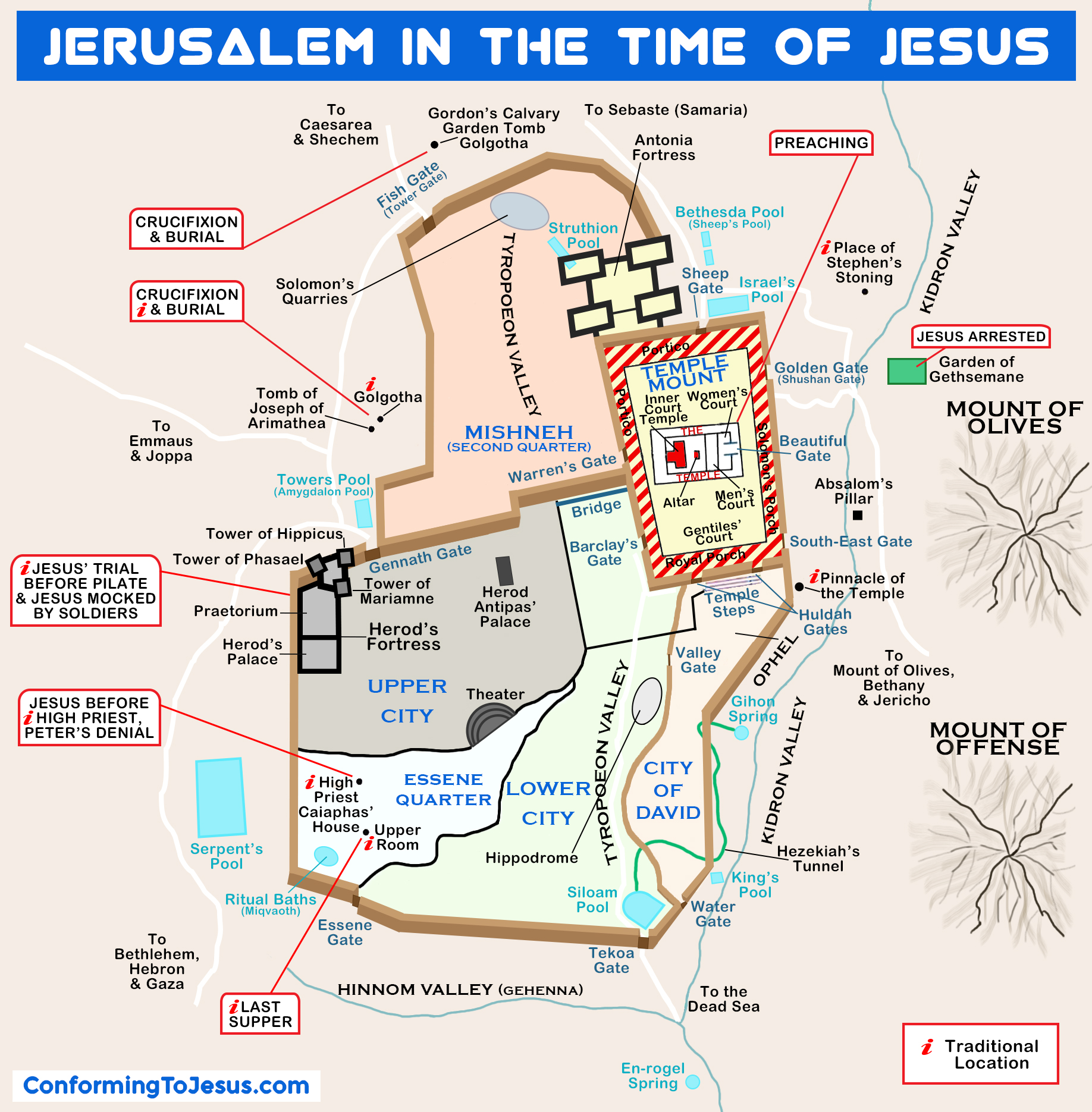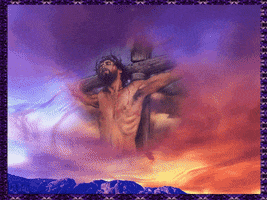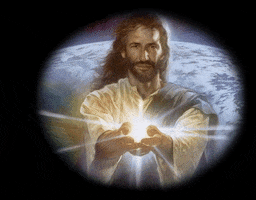A Weekend in Jerusalem with Jesus

Tired of weekends at Waikiki or Las Vegas?
Why not time-travel to Jerusalem for Passover weekend, 30 AD?
The Missing Body of Christ

The Awakening from the Dead
The Renewal of All Things
The Book of Life
The One Way Home

Our “Three Day Weekend with Jesus in Jerusalem” commences with Sunset Thursday (which is actually Friday), moves into Saturday and Sunday all day. I suggest that the most important events in the history of the world took place pretty much in a rapid cascade on this one weekend. The harsh reality of the betrayal, trial and murder of Jesus is ignored by most of the world to this day. Preachers preach in snippets from the Bible record, ignoring the big picture. But we are all implicated and accountable. There are some rather startling aspects to this whole scenario. One is the desertion by the men disciples at the ninth hour of their Leader’s need. Another surprise is the loyalty and care of the women disciples of Jesus.
Thursday Night
* The Passover Dinner ----Thursday night (early Friday) (Mark 14:12-17, Matthew 26:17-20, Luke 22:7-16, 24-30).
[Some scholars believe his event took place on Wednesday night because the scripture that says, "Then some of the scribes and Pharisees said to him, ‘Teacher, we wish to see a sign from you.’ But he answered them, ‘An evil and adulterous generation asks for a sign, but no sign will be given to it except the sign of the prophet Jonah. For just as Jonah was for three days and three nights in the belly of the sea monster, so for three days and three nights the Son of Man will be in the heart of the earth." (Matthew 12:38-40)]
~6:00 PM Passover Meal at the “Upper Room.” This was probably catered or arranged ahead of time. It may have been held in a rented room near Mt. Zion or perhaps in a borrowed living room?
~6:30 PM Foot Washing by Jesus. (But who washed the feet of Jesus)? (John 13:1-20)
~7:00 Dinner
* After Dinner Remarks by Jesus
* The Betrayal of Judas and Judas leaves ----(Mark 14:17-21, Matthew 26:/1-25, Luke 22:21-23, John 13:21-30).
* Institution of the New Covenant with Israel by Jesus ----(Mark 14:37-31, Matthew 26:31-35, Luke 22:31-38, John 13:31-38)
* The Farewell Discourse of Jesus with his eleven disciples ----(John 13, 14)
* Jesus and the Eleven then adjourn to the Garden of Gethsemane, on foot by way of vineyards to the South and East above the Hinnom Valley.
* Jesus teaches on the Vine and the Branches---- (John 15, 16)
* The High Priestly Prayer of Jesus, John 17
* A Hymn was sung at the Mt. of Olives. The prayers of Jesus in the the Garden of Gethsemane followed. ----Mark 14:26-42, Matthew 26:30-46, Luke 22:39-46, John 18:1
* The Arrest of Jesus in the Garden of Gethsemane. ----(Mark 14:43-52, Matthew 26:47-56, Luke 22:47-53, John 18:2-12)
* The Disciples Flee
*All night illegal trials of Jesus (six total):
+ The Jewish Trial before Annas, the retired high priest then before Caiaphas, the current high priest and the Sanhedrin ----(John 18:12-23)
+ Night trials with mocking and demeaning ----(Mark 14:53-65, Matthew 26:57-68, Luke 22:54-65, John 18:24)
+ Peter denies Jesus three times (predawn) ----(Mark 14:54-72, Matthew 26:58-75, Luke 22:54-62, John 18:15-27)
+ The Remorse of Judas ----(Matthew 27:3-10, Acts 1:18-19)
+ Jesus before Pilate (First Appearance) ---- (Mark 15:1-5, Matthew 27:2-14, Luke 23:1-5, John 18:28-38)
+ Jesus appears before Herod Antipas the Tetrarch ----(Luke 23:6-12, John 19:14)
* Pilate (2nd appearance) ----(Mark 15:6-15, Matthew 27:15-26, Luke 23:13-25, John 18:39, 19:16)
* Jesus Mocked by Roman Soldiers (6-9 AM) ----(Mark 15:16-19, Matthew 27:27-30)
* Jesus carries the Cross to Golgotha. ----Simon of Cyrene assists (Mark 15:20-23, Matthew 27:31-34, Luke 23:26-33, John 18:16-17)
* Friday 0900. Jesus Nailed to the Cross. Inscription posted ----(Mark 15:24-32, Matthew 27:35-44, Luke 23:33-43, John 18:18-37)
The First Three Hours 0900—12 noon
Jesus our Great High Priest
* First Three Words from the Cross
Luke 23:34: Father, forgive them, for they know not what they do.
Luke 23:43: Truly, I say to you, today you will be with me in paradise.
John 19:26–27: Woman, behold your son. Son, behold your mother
Noon--3:00 PM: Darkness over the land

* The thief next to Jesus forgiven, (Luke 23:33-43)
The Last Three Hours on the Cross 12 Noon--3 PM
* Jesus the Sacrificial Victim
* Jesus the high priest becomes the sacrifice---(Mark 15:33-37, Matthew 27:45-50, Luke 23:44-46, John 19:28-30)
* Last Four Words of Jesus
My God, My God, why have you forsaken me?---(Matthew 27:46 & Mark 15:34 )
I thirst.---(John 19:28)
It is finished.---(John 19:30). (From the Greek "Tetelestai" which is also translated "It is accomplished", or "It is complete".)
Father, into thy hands I commit my spirit.---(Luke 23:46)
* Events at the time Jesus died
“Then, behold, the veil of the temple was torn in two from top to bottom; and the earth quaked, and the rocks were split, and the graves were opened; and many bodies of the saints who had fallen asleep were raised; and coming out of the graves after His resurrection, they went into the holy city and appeared to many.
So when the centurion and those with him, who were guarding Jesus, saw the earthquake and the things that had happened, they feared greatly, saying, “Truly this was the Son of God!” (Matthew 27:51-54)
(Mark 15:38-51, Matthew 27:51-56, Luke 23:45-49, John 19:31-42)
Permission to break legs of the three. Jesus is already dead. His five garments had been divided by the soldiers. (Jesus died naked).
A Centurion pierces the body of Jesus. Women take the body down and cover the body with a sheet or burial shroud. A tomb is borrowed from Joseph of Arimathea for the weekend. Spices brought to tomb by the women. Guards set. Tomb sealed
* Sunset: The Sabbath came in at 6:00 PM. The women observed the Sabbath (rested) from Friday 6:00 PM to Saturday 6:00 PM. ---(Mark 15:38-41, Matthew 27:51-56, Luke 23:45-49)
* The Burial of Jesus (Friday before sundown)---(Mark 15:42-46, Matthew 27:57-60, Luke 23:50-54, John 29:31-42)
* Saturday Sabbath (Friday sunset until Saturday sunset)
*The women watch over the tomb. Roman soldiers standing guard. Sunset Friday to Sunset Saturday

Saturday
The real work of God was carried out behind the scenes. Outside of earth time! The Bible says much about the entire world being reconciled to God in the cosmic sacrifice of Jesus on that very weekend in Jerusalem.
Jesus carries all of the of the sin of everyone who ever lived (retroactive to Adam and Proactive to the end of time)—out of the universe into eternal hell—unto the cosmic garbage dump. This event was outside of our limited space-time domain, encompassing all time.
“For the love of Christ compels us, because we judge thus: that if One died for all, then all died; and He died for all, that those who live should live no longer for themselves, but for Him who died for them and rose again.
Therefore, from now on, we regard no one according to the flesh. Even though we have known Christ according to the flesh, yet now we know Him thus no longer. Therefore, if anyone is in Christ, he is a new creation; old things have passed away; behold, all things have become new.
Now all things are of God, who has reconciled us to Himself through Jesus Christ, and has given us the ministry of reconciliation, that is, that God was in Christ reconciling the world to Himself, not imputing their trespasses to them, and has committed to us the word of reconciliation.” (2 Corinthians 5:14-19)
----------------------------
“...knowing that you were not redeemed with corruptible things, like silver or gold, from your aimless conduct received by tradition from your fathers, but with the precious blood of Christ, as of a lamb without blemish and without spot. He indeed was foreordained before the foundation of the world, but was manifest in these last times for you who through Him believe in God, who raised Him from the dead and gave Him glory, so that your faith and hope are in God.” (1 Peter 1:18-21)
------------------------------
“But Christ came as High Priest of the good things to come, with the greater and more perfect tabernacle not made with hands, that is, not of this creation. Not with the blood of goats and calves, but with His own blood He entered the Most Holy Place once for all, having obtained eternal redemption. For if the blood of bulls and goats and the ashes of a heifer, sprinkling the unclean, sanctifies for the purifying of the flesh, how much more shall the blood of Christ, who through the eternal Spirit offered Himself without spot to God, cleanse your conscience from dead works to serve the living God? And for this reason He is the Mediator of the new covenant, by means of death, for the redemption of the transgressions under the first covenant, that those who are called may receive the promise of the eternal inheritance.
“For where there is a testament, there must also of necessity be the death of the testator. For a testament is in force after men are dead, since it has no power at all while the testator lives. Therefore not even the first covenant was dedicated without blood. For when Moses had spoken every precept to all the people according to the law, he took the blood of calves and goats, with water, scarlet wool, and hyssop, and sprinkled both the book itself and all the people, saying, “This is the blood of the covenant which God has commanded you.” Then likewise he sprinkled with blood both the tabernacle and all the vessels of the ministry. And according to the law almost all things are purified with blood, and without shedding of blood there is no remission.
“Therefore it was necessary that the copies of the things in the heavens should be purified with these, but the heavenly things themselves with better sacrifices than these. For Christ has not entered the holy places made with hands, which are copies of the true, but into heaven itself, now to appear in the presence of God for us; not that He should offer Himself often, as the high priest enters the Most Holy Place every year with blood of another— He then would have had to suffer often since the foundation of the world; but now, once at the end of the ages, He has appeared to put away sin by the sacrifice of Himself. And as it is appointed for men to die once, but after this the judgment, so Christ was offered once to bear the sins of many. To those who eagerly wait for Him He will appear a second time, apart from sin, for salvation.” (Hebrews 9:11-28)
----------------------------
For Christ also suffered once for sins, the just for the unjust, that He might bring us to God, being put to death in the flesh but made alive by the Spirit, by whom also He went and preached to the spirits in prison, who formerly were disobedient, when once the Divine longsuffering waited in the days of Noah, while the ark was being prepared, in which a few, that is, eight souls, were saved through water. There is also an antitype which now saves us—baptism (not the removal of the filth of the flesh, but the answer of a good conscience toward God), through the resurrection of Jesus Christ, who has gone into heaven and is at the right hand of God, angels and authorities and powers having been made subject to Him.” (1 Peter 3:18-22)
Did Christ Descend into Hell?
Jesus’ Death: Six Hours of Eternity on the Cross
Sacrifice Sunday
Entering God's Sabbath Rest
The Renewal of All Things
Hard Times
Sunday morning
* A second great earthquake (Matthew 28:1-6)
* He Is Risen (Mark 16:1–8; Luke 24:1–12; John 20:1–10, 11-18)
Now after the Sabbath, as the first day of the week began to dawn, Mary Magdalene and the other Mary came to see the tomb. And behold, there was a great earthquake; for an angel of the Lord descended from heaven, and came and rolled back the stone from the door, and sat on it. His countenance was like lightning, and his clothing as white as snow. And the guards shook for fear of him, and became like dead men.
But the angel answered and said to the women, “Do not be afraid, for I know that you seek Jesus who was crucified. He is not here; for He is risen, as He said. Come, see the place where the Lord lay.”
* Appearances of Jesus (John 20:11-28, Matthew 28:9-10)
* The tomb guards report to headquarters (Matthew 28:11-15)
* Road to Emmaus Sunday afternoon (Mark 16:12-13, Luke 24:13-35)
* Sunday evening gathering in Jerusalem (Mark 16:14, Luke 24:36-43, John 20:19-25)
* Gathering one week later (John 20:26-31)
* Appearance in Galilee (John 21)
* Next Forty Days
* Appearance to 500 followers (Mark 16:15-20, Matthew 28:16-20, 1Corinthians 15:6,7, Luke 24:44-49, Acts 1:3-8)
* Ascension (Mark 16:19-20, Luke 24:50-53, Acts 1:9-12)
Pentecost (Acts 1ff) 50 days later.

]
The Quickening
|
Resurrection power is like no other power on earth. It is unique, and has no possible rival. It is a power that operates in the midst of death and despair. It operates when the entire world seems, bleak, dead, and barren. It explodes into life and light in the midst of an empty, dark cemetery--for that is where it was first demonstrated. When Jesus Christ was resurrected, He came out from among the dead. So if you learn to live by resurrection power, you can experience life, hope, and vitality when everything and everyone around you is dead, hopeless, and lifeless.
Resurrection power is a "stealth" power--silent and invisible. It makes no sound, it operates below the radar scope of this world. Other forms of power are noisy and obvious--they pound, pulsate, throb, hum, roar, buzz, or explode. But resurrection power is silent. It accomplishes its purpose without ostentation, flash, pizazz, or neon lights. Christians who live by resurrection power don't use it to dazzle others or advertise its affects. That's why the distinguishing marks of Christian character are humility and servanthood rather than showiness. Genuine Christians demonstrate the reality of resurrection power through the quiet evidence of their lives: love, joy, peace, endurance under hardships, kindness, goodness, faithfulness, gentleness, and self-control.
God has a marvelous way of illustrating spiritual truth through nature. He demonstrates His resurrection power every year through every returning springtime. Out of the cold, barren, death of winter, God brings new life, color, warmth, and glory by means of a quiet, invisible force which gradually transforms the whole landscape into a fairyland of beauty.
Resurrection power is irresistible. It cannot be thwarted or turned aside. It takes absolutely no account of any obstacles thrown in its path, except to use them for further opportunities to advance its cause. When Jesus came bursting from the grave, He didn't give the slightest attention to the obstacles man had placed in His way. There was a large stone in front of His tomb; He passed right through it. He was wrapped in yard after yard of linen cloth; He left the grave clothes undisturbed behind Him. There were Roman guards in front of His tomb; He ignored them. He took not the slightest notice of the decrees of Caesar or the orders of Pilate or the fulminations of the Jewish priests. --Ray Stedman, According to the Power. |
|
The Quick and the Dead

The Quick and the Dead is an English phrase originating in William Tyndale's English translation of the New Testament (1526), "I testified therefore before god and before the Lord Jesus Christ which shall iudge quicke and deed at his aperynge in his kyngdom" [2 Tim 4:1], and used by Thomas Cranmer in his translation of the Nicene Creed for the first Book of Common Prayer (1540). In the following century the idiom was referenced both by Shakespeare's Hamlet (1603) and the King James Bible (1611). More recently the final verse of The Book of Mormon (first published in 1830), refers to "...the Eternal Judge of both quick and dead".
…The phrase is found in three passages in the 1611 King James version of the Bible: in the Acts of the Apostles (Acts 10:42), Paul's letters to Timothy (2 Timothy 4:1), and the First Epistle of Peter. The last reads: "For the time past of our life may suffice us to have wrought the will of the Gentiles, when we walked in lasciviousness, lusts, excess of wine, revelings, banquetings, and abominable idolatries: Wherein they think it strange that ye run not with them to the same excess of riot, speaking evil of you: Who shall give account to him that is ready to judge the quick and the dead". This passage advises the reader of the perils of following outsiders in not obeying God's will. Specifically it warns that those who sin, both the quick and the dead, will be judged by Jesus Christ. In other words, it implies that God is able to act on the sins of a person whether that person is alive (quick) or has passed into the afterlife(dead).
In the Nicene Creed the phrase appears in the following passage (taken from the Book of Common Prayer, 1662).
[He] ascended into heaven, And sitteth on the right hand of the Father. And he shall come again with glory to judge both the quick and the dead.
In the Apostles' Creed the phrase appears in the following passage (also taken from the 1662 Book of Common Prayer).
He ascended into heaven, And sitteth on the right hand of God the Father Almighty; From thence he shall come to judge the quick and the dead.
Etymology: 1: to quicken something
2: to come to life especially to enter into a phase of active growth and development seeds quickening in the soil
3: to reach the stage of gestation at which fetal motion is felt
4: to shine more brightly watched the dawn quickening in the east
5: to become more rapid "her pulse quickened at the sight." The use of the word quick in this context is an archaic one, specifically meaning living or alive; therefore, this idiom refers to 'the living and the dead.' The meaning of "quick" in this way is still retained in various common phrases, such as the "quick" of the fingernails, and in the idiom quickening, as the moment in pregnancy when fetal movements are first felt.) Another common phrase, "cut to the quick", literally means cut through the dead, unfeeling layers of the skin to the living, sensitive tissues below.
(Wikipedia)

"For behold, the day comes, burning like an oven, when all the arrogant and all evildoers will be stubble;
the day that comes shall born them up, says the LORD of hosts, so that it will leave them neither root nor branch.
But for you who fear my name the sun of righteousness shall rise, with healing in its wings."
"You shall go forth leaping like calves from the stall.
And you shall tread down the wicked, for they will be ashes under the soles of your feet,
on the day when I act, says the LORD of hosts.
Remember the law of my servant Moses...
Behold, I will send you Elijah the prophet before the great and terrible day of the LORD comes.
And he will turn the hearts of fathers to their children and the hearts of children to their fathers,
lest I come and smite the land with a curse."
(Malachi 4:1-6)
|



Music
Low in the grave He lay
Jesus my Savior!
Waiting the coming day
Jesus my Lord!
Up from the grave He arose
With a mighty triumph o'er His foes
He arose a Victor from the dark domain
And He lives forever with His saints to reign
He arose! (He arose)
He arose! (He arose)
Hallelujah! Christ arose!
Up from the Grave He Arose
Would you be free from the burden of sin?
There's power in the blood
Power in the blood
Would you o'er evil a victory win?
There's wonderful power in the blood
There is power, power, wonder working power
In the blood of the Lamb
There is power, power, wonder working power
In the precious blood of the Lamb
Would you be free from your passion and pride?
There's power in the blood
Power in the blood
Come for a cleansing to Calvary's tide
There's wonderful power in the blood
There is power, power, wonder working power
In the blood of the Lamb
There is power, power, wonder working power
In the precious blood of the Lamb
…
There is power, power, wonder working power
In the blood of the Lamb
There is power, power, wonder working power
In the precious blood of the Lamb
There is power, power, wonder working power
In the blood of the Lamb
There is power, power, wonder working power
In the precious blood of the Lamb
There is Power in the Blood
Come, Sweet Death
Wachet Auf (Wake Up)


Some References
In the Cross
Six Hours in Eternity on The Cross
Nekrosis and Thanatos (Dying and Death)
Earthquakes and the Bible
Real Life Now
How Jesus Saves
The Eightfold Way to Knowing God
Dry Bones
The Wedding Psalm (45)
The Call of Heaven
Behold the Messiah
Jesus, Our Great High Priest
Jesus, our Trailblazer
Seek the Things that Are Above



Lambert Dolphin
Email is welcome
Lambert Dolphin's Place
Recent and Recovered Articles
Newsletters Old and New
July 23, 2019, March 5, 2022. April 6, 2023










